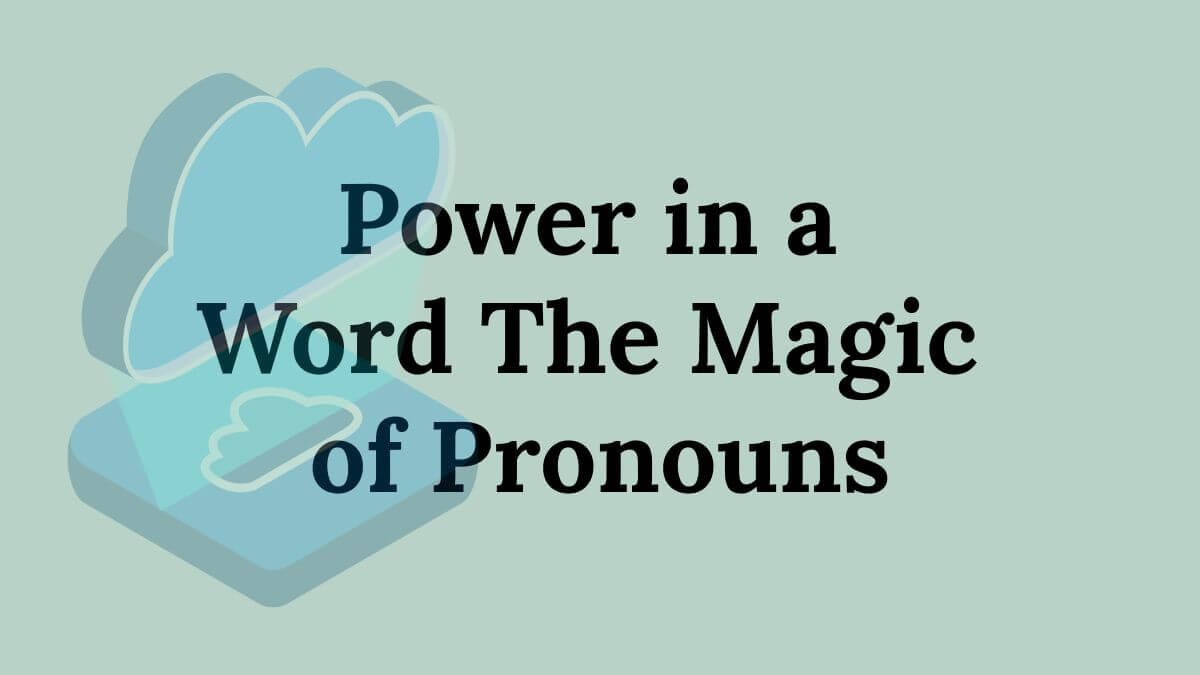Pronouns might seem like small words, but they hold incredible power in our language. The magic of pronouns lies in their ability to simplify communication, create connection, and express identity. Whether you’re a learner or an educator of English grammar, understanding pronouns deeply can transform how you write and speak. Let’s explore how pronouns work, why they matter, and how you can master them with ease.
What Are Pronouns and Why Are They Important?
Pronouns step in for nouns to prevent repetition and make your sentences flow effortlessly.. Instead of saying, “Anna went to Anna’s house because Anna forgot Anna’s book,” we say, “Anna went to her house because she forgot her book.” This simple switch makes language more natural and easier to follow.
The Basic Types of Pronouns
Pronouns come in various types, each serving a distinct purpose in our sentences.:
- Personal pronouns stand in for particular people or things, such as I, you, he, she, it, we, and they.
- Possessive pronouns highlight ownership or belonging, like mine, yours, his, hers, ours, and theirs.
- Reflexive pronouns point back to the subject of the sentence, emphasizing that the action is done by and for the same person, like myself, yourself, himself, and themselves.
- Demonstrative pronouns are used to indicate specific items or people, such as this, that, these, and those.
- Interrogative pronouns are used to ask questions and gather information—words like who, whom, whose, which, and what.
- Relative pronouns connect clauses and add extra details about a noun, using words like who, whom, whose, which, and that.
- Indefinite pronouns refer to people or things in a general way, without naming them directly—like everyone, someone, anything, and none.
Using the right pronoun at the right time is part of the magic of pronouns that makes language efficient and engaging.
How Pronouns Enhance Clarity and Flow
Pronouns help keep sentences clear and natural, avoiding the awkwardness of repeating the same noun over and over. Pronouns keep the text or speech concise and pleasant to the ear.
Example: Making Sentences Smooth and Natural
Consider these two sentences:
- Sarah likes Sarah’s dog. Sarah takes Sarah’s dog to the park.
- Sarah likes her dog. She takes it to the park.
The second example flows smoothly because pronouns replace repeated nouns. This is where the magic lies—pronouns save us from redundancy while keeping meaning clear.
The Magic of Pronouns in Identity and Respect
Beyond grammar, pronouns also hold social significance. In today’s world, sharing and respecting personal pronouns (he/him, she/her, they/them, etc.) is a way of acknowledging identity and promoting inclusivity.
Why Pronouns Matter in Communication
Using the correct pronouns when referring to someone is a sign of respect. It creates a safe and welcoming environment, especially in diverse communities and classrooms. This respectful use highlights how pronouns are more than just grammar tools—they have a social power too. Power in a Word: The Magic of Pronouns
Common Challenges Learners Face with Pronouns
For English learners, pronouns can sometimes be tricky due to:
- Gender differences (he vs. she)
- Singular vs. plural forms (I vs. we, it vs. they)
- Subject vs. object cases (he vs. him, she vs. her)
- Reflexive pronouns (yourself, themselves)
- Possessive pronouns vs. possessive adjectives (mine vs. my)
Tips to Master Pronouns
- Strengthen your grammar skills by rewriting sentences, swapping out nouns for the correct pronouns.
- Pay attention to pronoun-antecedent agreement (make sure the pronoun matches the noun it replaces in number and gender).
- Use online quizzes and exercises for reinforcement.
- Listen to native speakers and notice how pronouns are used naturally.
Examples of Pronouns in Action
Here are some sentences demonstrating the magic of pronouns in different contexts:
- Personal: They are coming to the party.
- Possessive: This book is mine.
- Reflexive: She taught herself to play the piano.
- Demonstrative: That is a beautiful painting.
- Interrogative: Who is calling?
- Relative: The teacher who helped me yesterday is in the staff room now.
- Indefinite: Someone left their umbrella here.
The Essential Role of Pronouns in Writing and Speaking
Using pronouns correctly is essential for effective communication. In writing, pronouns create coherence by linking sentences and ideas. In speaking, they help listeners follow the conversation easily.
Read More:
Basic Sentence Structure Made Easy With Clear Examples
7 Common Mistakes with Auxiliary and Modal Verbs – And How to Fix Them!
Power in a Word: The Magic of Pronouns
How Educators Can Help Students with Pronouns
Teachers can encourage learners to:
- Identify pronouns in reading materials.
- Practice rewriting sentences, replacing nouns with pronouns.
- Use pronouns in storytelling exercises.
- Discuss the importance of pronouns in identity and inclusivity.
Conclusion: Embrace the Magic of Pronouns
The magic of pronouns lies in their power to simplify language, improve communication, and express respect and identity. Mastering pronouns can elevate your English skills, making your speech and writing clear, smooth, and engaging. Whether you’re learning English or teaching it, understanding and using pronouns confidently is a key step toward effective communication. Remember, every pronoun you use carries the power to connect ideas and people. So celebrate the magic hidden in these small but mighty words ! If you want to deepen your knowledge and practice, explore exercises on pronouns at [englishgrammarway.com]—your friendly partner in mastering English grammar.
Meta Description: Discover the magic of pronouns and their power to transform your English communication. Learn how to use pronouns correctly with clear examples and tips
